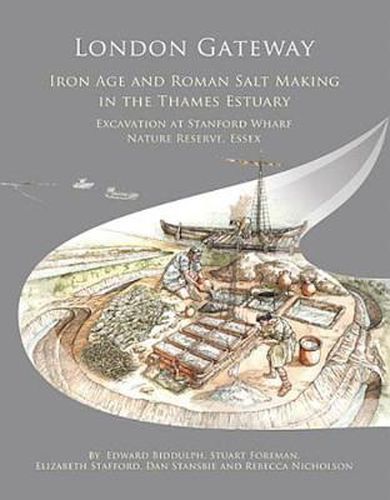Readings Newsletter
Become a Readings Member to make your shopping experience even easier.
Sign in or sign up for free!
You’re not far away from qualifying for FREE standard shipping within Australia
You’ve qualified for FREE standard shipping within Australia
The cart is loading…






Excavation by Oxford Archaeology in 2009 during construction of the Stanford Wharf Nature Reserve, funded and supported by the developer, DP World London Gateway, uncovered remarkable evidence for Iron Age and Roman-period salt making and associated activities. Structures included a probable boathouse, unique in Roman Britain. The excavations shed new and important light on evolving methods of salt production, which reflect wider changes in economy and society in the Thames Estuary between c. 400 BC and AD 400. Salt had a particular economic importance in the ancient world as a food preservative - changing scale and methods of production provide an essential background for understanding processes such as urbanisation, civilian trade and military supply. Salt also had a wide range of dietary, social and symbolic functions, from flavouring food to forming an ingredient in medicines and religious rituals. In the words of the Roman naturalist Pliny the Elder, writing in the first century AD, ‘civilised life cannot proceed without salt’.
This monograph presents the internationally important findings of three years of fieldwork and post-excavation analysis. The large scale of investigation and extensive scientific analysis of the remains has transformed our understanding of the important Iron Age and Roman salt making industry in Essex. A companion volume on the marine investigations conducted by Wessex Archaeology is presented in: London Gateway: Maritime Archaeology in the Thames Estuary.
$9.00 standard shipping within Australia
FREE standard shipping within Australia for orders over $100.00
Express & International shipping calculated at checkout
Excavation by Oxford Archaeology in 2009 during construction of the Stanford Wharf Nature Reserve, funded and supported by the developer, DP World London Gateway, uncovered remarkable evidence for Iron Age and Roman-period salt making and associated activities. Structures included a probable boathouse, unique in Roman Britain. The excavations shed new and important light on evolving methods of salt production, which reflect wider changes in economy and society in the Thames Estuary between c. 400 BC and AD 400. Salt had a particular economic importance in the ancient world as a food preservative - changing scale and methods of production provide an essential background for understanding processes such as urbanisation, civilian trade and military supply. Salt also had a wide range of dietary, social and symbolic functions, from flavouring food to forming an ingredient in medicines and religious rituals. In the words of the Roman naturalist Pliny the Elder, writing in the first century AD, ‘civilised life cannot proceed without salt’.
This monograph presents the internationally important findings of three years of fieldwork and post-excavation analysis. The large scale of investigation and extensive scientific analysis of the remains has transformed our understanding of the important Iron Age and Roman salt making industry in Essex. A companion volume on the marine investigations conducted by Wessex Archaeology is presented in: London Gateway: Maritime Archaeology in the Thames Estuary.